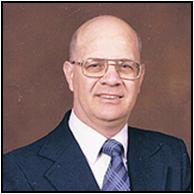 |
|
| Volume 22 Number 2 February 2020 | Page 10 |

Mark McWhorter
 In Colossians 2:2, we read, “That their hearts might be knit together in love, and unto all riches of the full assurance of understanding, to the acknowledgment of the mystery of God, and of the Father, and of Christ” (KJV). Paul was writing to the Colossians to assure them that the Gospel they had obeyed was the truth. He wanted them to stand against any teachings that stated Christ was not the actual Son of God. He wanted them to know that the truth he received from God was the same truth that Christ and the Father taught. He wanted them to know that the truth they had obeyed was the only spiritual truth.
In Colossians 2:2, we read, “That their hearts might be knit together in love, and unto all riches of the full assurance of understanding, to the acknowledgment of the mystery of God, and of the Father, and of Christ” (KJV). Paul was writing to the Colossians to assure them that the Gospel they had obeyed was the truth. He wanted them to stand against any teachings that stated Christ was not the actual Son of God. He wanted them to know that the truth he received from God was the same truth that Christ and the Father taught. He wanted them to know that the truth they had obeyed was the only spiritual truth.
Then, in the verse above, Paul told them that rather than being divided, they needed to be united in love. They needed to stand united in knowing with assurance that they were already receiving the true spiritual riches that can only be found in Christ.
The English words “knit together” tend to give a picture of a passive act of joining hands. There is not necessarily anything wrong with that picture, but the Greek word has a basic meaning of driving or forcing things together. With that understanding, one gets a mental picture of Christians having an internal driving force that compels them to join hands. Without joining hands in unity, there is an intense feeling of something lacking. Each Christian would feel incomplete and disjointed unless that knitting together was a reality. The intended strength of unity that God desires for the church would be weakened immensely without that knitting together, and the assurance of understanding the riches of God would be put in question.
Study your Bible. Learn about our great God. Learn about His love and all the rest of the spiritual riches He wants you to have. Then, do what you can to knit together with other Christians. If any of this is hard to understand, ask an adult to help you.![]()
Bible Commentaries
and Reference Books
Donald R. Fox
 Some forty-five years ago, a close friend gave me The People’s New Testament by B.W. Johnson. It has simple explanatory notes and commentary on the Scriptures. It uses both the King James and the Revised versions in conjunction with Scripture cross-references. All are easy to use, and for this, I am thankful. I am a down-to-earth man and The People’s New Testament was the very tool I needed as I started my studies of the Word of God. Currently, the pages are loose and in need of rebinding. I use it all the time and teach from it. Sometimes, I say that my complete brain is in this testament; almost every page is loaded with personal notes I have written over the years.
Some forty-five years ago, a close friend gave me The People’s New Testament by B.W. Johnson. It has simple explanatory notes and commentary on the Scriptures. It uses both the King James and the Revised versions in conjunction with Scripture cross-references. All are easy to use, and for this, I am thankful. I am a down-to-earth man and The People’s New Testament was the very tool I needed as I started my studies of the Word of God. Currently, the pages are loose and in need of rebinding. I use it all the time and teach from it. Sometimes, I say that my complete brain is in this testament; almost every page is loaded with personal notes I have written over the years.
Although I really enjoy Johnson’s the People’s New Testament, I always remember that the Scriptures themselves are the final standard. My notes and B.W. Johnson’s explanatory remarks are just that, our view or understanding of the Scriptures. For the greater part, B.W. Johnson’s notes and my own annotations are correct and in accordance with the Scriptures. The point I am making is that the Word of God—the Bible—is the final and only true standard. We must not go beyond what is written. “All scripture is given by inspiration of God, and is profitable for doctrine, for reproof, for correction, for instruction in righteousness: That the man of God may be perfect, throughly furnished unto all good works” (2 Timothy 3:16-17 KJV).
Mistakes & Errors Are
Part of Men’s Endeavors
Johnson’s explanatory notes are the work of a man, and men make mistakes. As an example, let us notice Johnson’s commentary on Acts 2:1. Scripture says, “And when the day of Pentecost was fully come, they were all with one accord in one place.” Johnson states, “they were all…in one place. Not only the apostles, but the hundred and twenty disciples. They probably had an intimation that the promised day had come.” With that comment, Mr. Johnson alludes that the apostles and the 120 disciples were all baptized with the Holy Spirit (Acts 2:2-4). The Bible does not teach this. Please note the last verse in Chapter 1, where it reads, “And they gave forth their lots; and the lot fell upon Matthias; and he was numbered with the eleven apostles” (Acts 1:26). Back to Acts 2:1; who are the “they”? Of course, it was the twelve apostles and not the 120.
Only the Apostles Could
Impart a Miraculous
Gift of the Holy Spirit
Let us study an example of only the apostles having the baptismal measure of the Holy Spirit. The preacher Philip conducted missionary work in Samaria. The Bible says:
But when they believed Philip preaching the things concerning the kingdom of God, and the name of Jesus Christ, they were baptized, both men and women. Then Simon himself believed also: and when he was baptized, he continued with Philip, and wondered, beholding the miracles and signs which were done. Now when the apostles which were at Jerusalem heard that Samaria had received the word of God, they sent unto them Peter and John: Who, when they were come down, prayed for them, that they might receive the Holy Ghost: (For as yet he was fallen upon none of them: only they were baptized in the name of the Lord Jesus.) Then laid they their hands on them, and they received the Holy Ghost. And when Simon saw that through laying on of the apostles' hands the Holy Ghost was given, he offered them money, Saying, Give me also this power, that on whomsoever I lay hands, he may receive the Holy Ghost. (Acts 8:12-19)
Philip confirmed his “preaching the things concerning the kingdom of God, and the name of Jesus Christ” (Acts 8:12) by performing “miracles and signs” (Acts 8:13). Why was it necessary to send for Peter and John who were at Jerusalem? Answer: Only the apostles were immersed, that is had the baptismal measure of the Holy Spirit. “The preacher sent there was not an apostle. He had miraculous powers but could not confer them. There is no record of their impartation, save in or by apostolic presence” (Johnson’s explanatory notes in part on Acts 8:14). We note that Mr. Johnson was correct in this case. The apostle Paul stated in Romans 1:11, “For I long to see you, that I may impart unto you some spiritual gift, to the end ye may be established.”
Only the apostles could impart a gift of the Holy Spirit by the laying on of their hands. Only the apostles were promised “the Comforter” (John 16:7). This “Comforter,” the Holy Spirit, would “guide” the apostles “into all truth” (John 16:13).
We all use reference books to increase our understanding and to take advantage of scholars’ knowledge of the Word of God. When a scholar or a commentator makes a mistake or misunderstands the Word of God, we don’t reject the whole reference book or the commentary, now do we? Our reference library has expanded to the “World Wide Web.” There are at our fingertips and clicks away a means to increase our understanding of all sorts of information. I choose to use all these facets of knowledge for the good and to reject sinful or erroneous aspects of these tools. As the proverbial expression goes, “Don’t throw the baby out with the bathwater.” Let us be grateful for the abundance of research material at our disposal, but let us use it cautiously and prudently.![]()